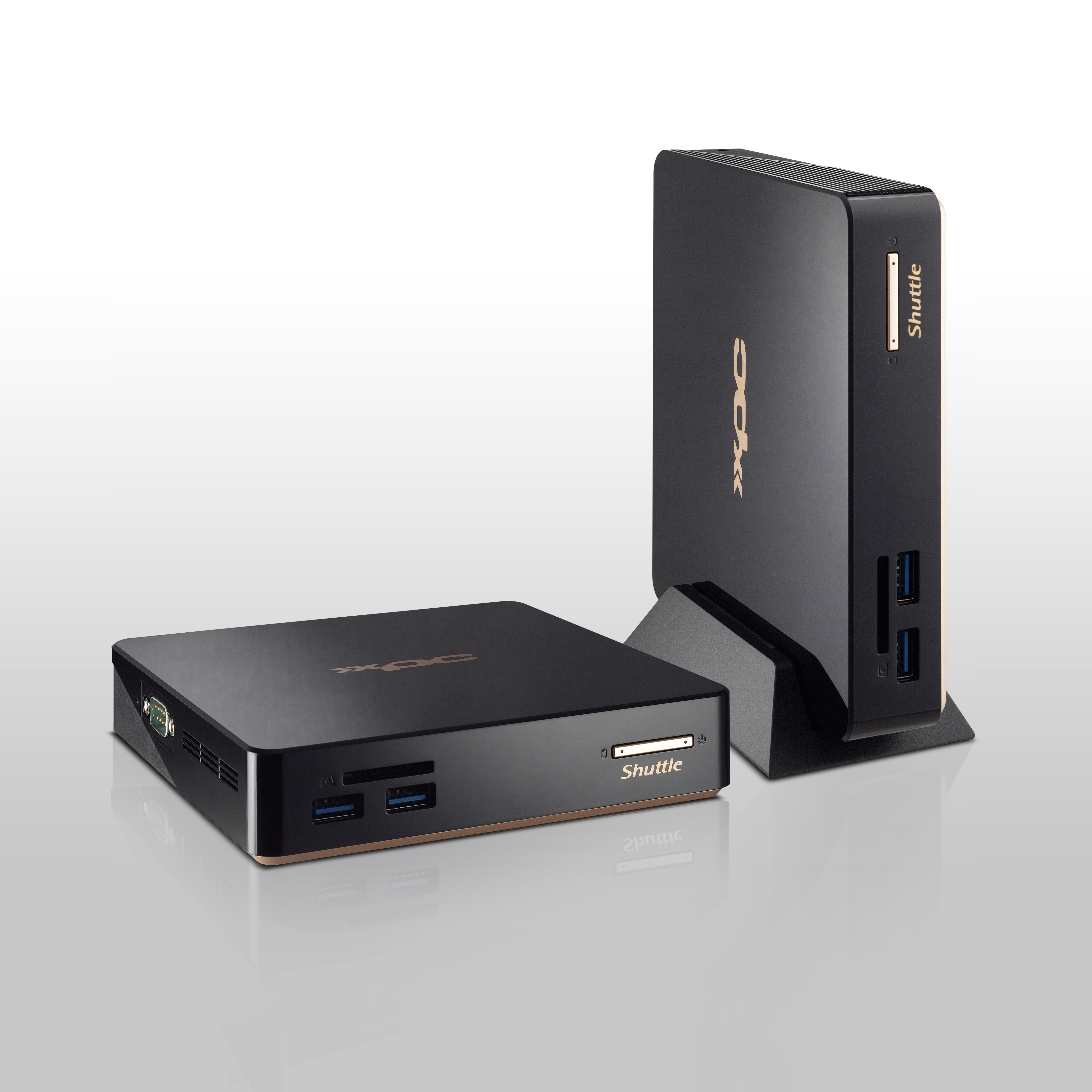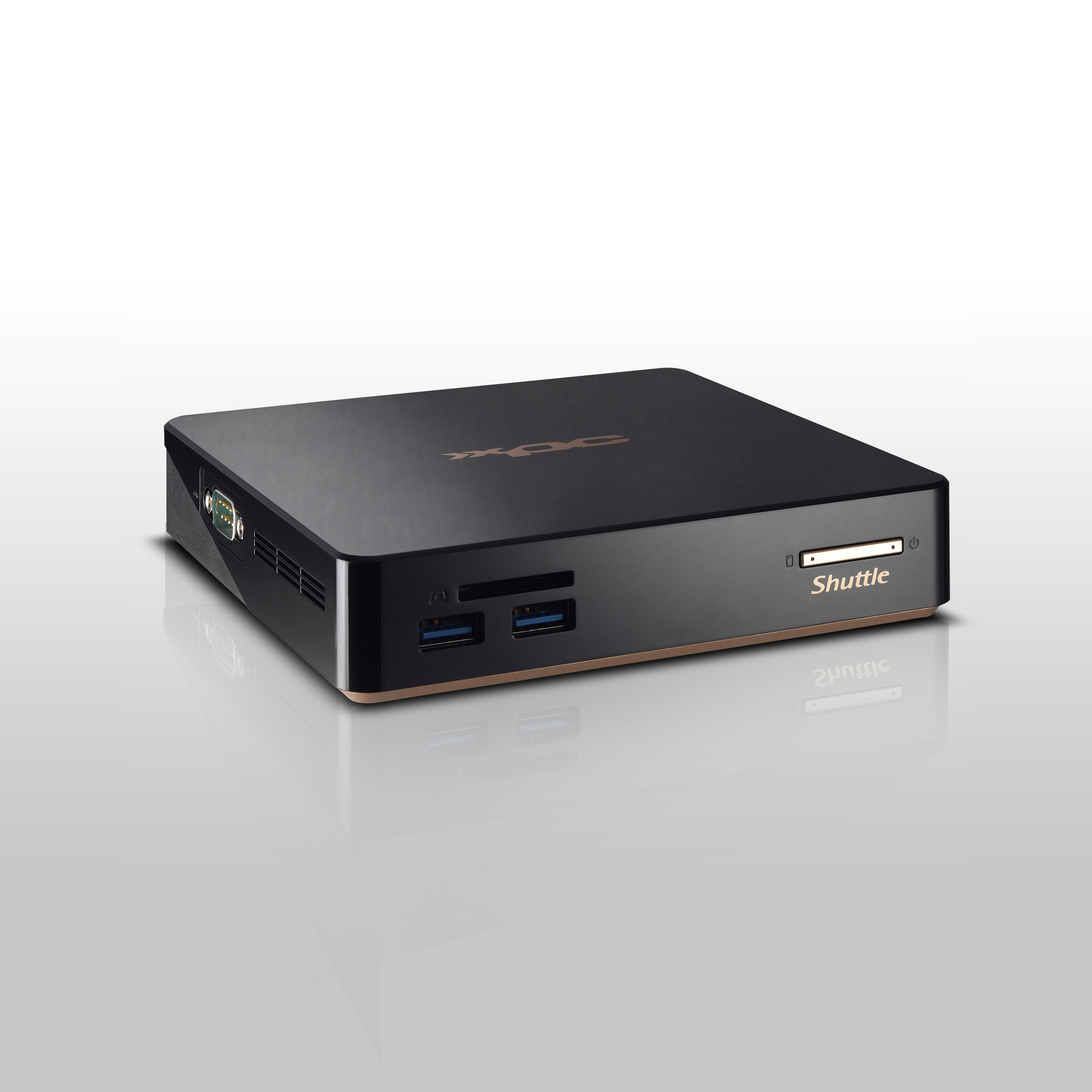Shuttle Introduces XPC Nano Series Of Mini PC

With the wave of compact ultra-low power hardware flooding onto the market, mini PCs such as Intel's NUC and Compute Stick, MSI's Cubi, Lenovo's Stick 300, Android mini-PCs, and more have proliferated. Shuttle has been working in this market for several years now, and now the company has extended its product line up with the XPC Nano series.
The XPC Nano is designed to be one of Shuttle's smallest mini PCs to date, measuring 29 mm wide, and with a total volume of 0.5 liters. Shuttle opted to use Intel's Broadwell processors inside of these systems instead of the newer Skylake CPUs. Shuttle didn't say why it did this, but it is likely in part to help keep the total system cost down.
Shuttle said that there will be multiple models in the XPC Nano series, with processors ranging from low-end Celeron units to high-end Core i7s. All of these systems will use Intel's integrated graphics solutions. The XPC Nano devices will use the more compact SO-DIMMs, with support for up to 16 GB of DDR3L in a dual-channel configuration.

For connectivity options, there will be an M.2 connector for an SSD in addition to a conventional 2.5-inch drive slot. As these are designed to be compact systems, HDDs or SSDs used in the XPC Nano cannot be thicker than 7 mm. The system will also support a number of other connections, including mini-DisplayPort, HDMI, USB 3.0, USB 2.0, RS-232, audio jacks, and an RJ45 port powered by an Intel gigabit Ethernet controller. (Shuttle didn't state how many ports would be on the system, however, just that all of these types of connections would be present.)
These systems will primarily be sold as barebones kits, but Shuttle plans to release the XPC Nano NC01UWIN10HE system, which will be a complete ready to use system with Windows 10 Home Edition pre-installed, during this holiday season.
There is no word on pricing or availability for the barebones XPC Nanos, but the XPC Nano NC01UWIN10HE will have a starting price of $279.
______________________________________________________________________
Get Tom's Hardware's best news and in-depth reviews, straight to your inbox.

Michael Justin Allen Sexton (or MJ) is a Contributing Writer for Tom's Hardware. As a tech enthusiast, MJ enjoys studying and writing about all areas of tech, but specializes in the study of chipsets and microprocessors. In his personal life, MJ spends most of his time gaming, practicing martial arts, studying history, and tinkering with electronics.
Follow Michael Justin Allen Sexton @EmperorSunLao. Follow us on Facebook, Google+, RSS, Twitter and YouTube.
-
RazberyBandit Isn't the "conventional" HDD size actually the 3.5-inch size? And since this drive slot only supports drives up to 7mm thick, it's completely unconventional since most laptop-oriented HDDs are 9.5mm thick.Reply
You should have simply stated that it has a 2.5" drive bay that supports SSDs and thin HDDs up to 7mm thick and called it a day... -
IInuyasha74 ReplyIsn't the "conventional" HDD size actually the 3.5-inch size? And since this drive slot only supports drives up to 7mm thick, it's completely unconventional since most laptop-oriented HDDs are 9.5mm thick.
You should have simply stated that it has a 2.5" drive bay that supports SSDs and thin HDDs up to 7mm thick and called it a day...
There are two conventional HDD sizes, 3.5-inch is the conventional desktop size and 2.5-inch is the conventional laptop size. I don't think anyone miss understood this. A lot of laptop hard drives are 7 mm thick as well, that isn't an uncommon size for a 2.5-inch drive. They do range in thickness, but 7 mm is one of the more common measurements for laptop hard drives and SSDs. -
RazberyBandit No, not 'a lot' of laptop drives are 7mm thick. Seagate's Momentus Thin and Hitachi's Z5K lineups come to my mind, along with a handful of low-capacity (500GB and below), outdated WD Blue & Black models.Reply
The majority of 2.5-inch HDDs on the market are 9.5mm thick. -
IInuyasha74 Reply17013902 said:No, not 'a lot' of laptop drives are 7mm thick. Seagate's Momentus Thin and Hitachi's Z5K lineups come to my mind, along with a handful of low-capacity (500GB and below), outdated WD Blue & Black models.
The majority of 2.5-inch HDDs on the market are 9.5mm thick.
Seriously? Okay, just for fun lets go to the website of a major tech retailer and look at their 2.5-inch HDDs.
http://www.newegg.com/Laptop-Internal-Hard-Drives/SubCategory/ID-380?Tid=167524
Newegg carries 2.5-inch drives in five different heights, and tells you exactly how many are each height. Not all of the drives are listed, but roughly 300 of them are. Of those drives they break up like this:
5 mm: 6
7 mm: 80
9 mm: 4
9.5 mm: 119
15 mm: 88
So going by this there are two 7 mm drives for every three 9.5 mm drive listed on Newegg. These drives have been around for several years now, so I don't understand why you are having such a hard time accepting that 7 mm 2.5-inch HDDs are common. -
RazberyBandit I'm glad you used Newegg as you did. By those numbers, 26.9-percent measure 7mm-thick while 40-percent measure 9.5mm. In total, 71-percent of all 2.5" HDDs on Newegg are thicker than 7mm.Reply
Obviously, Newegg also sells 3.5" drives. If you check, there are 2788 different ones available. That tells me that 3.5" is the common, or to reuse your word, conventional size. And if we were to combine all 2.5" and 3.5" drives to see what percentage of available HDDs are 7mm-thick, we'd find that number to be a paltry 2.5-percent.
I chose my wording wisely. The majority of 2.5" drives are in fact 9.5mm thick, and 2.5" is not the most common or conventional HDD size.
My argument was in regard to your word choice. As a former editor here, I found them poorly chosen and offered what I felt was a more acceptable alternative. You failed to qualify the term conventional with the word laptop prior to choosing to use it. But do continue looking at the numbers...the math doesn't lie. -
RealBeast Reply
You are completely wrong, and you do not seem to keep up with modern computer equipment. 7mm 2.5 inch drive are the new normal as laptops have gotten much thinner than in the past.17013902 said:No, not 'a lot' of laptop drives are 7mm thick. Seagate's Momentus Thin and Hitachi's Z5K lineups come to my mind, along with a handful of low-capacity (500GB and below), outdated WD Blue & Black models.
The majority of 2.5-inch HDDs on the market are 9.5mm thick.
-
Onus The article states "As these are designed to be compact systems, HDDs or SSDs used in the XPC Nano cannot be thicker than 7 mm." I see no reference to "conventional" drives; am I missing something? In any case, one of the most useful lessons I ever learned from a case studies course was that it is never useful to say what somebody "should have" done; it is only useful to figure out why they did what they did.Reply
It looks like a mountain is being made out a molehill here. Chill pills all around please?